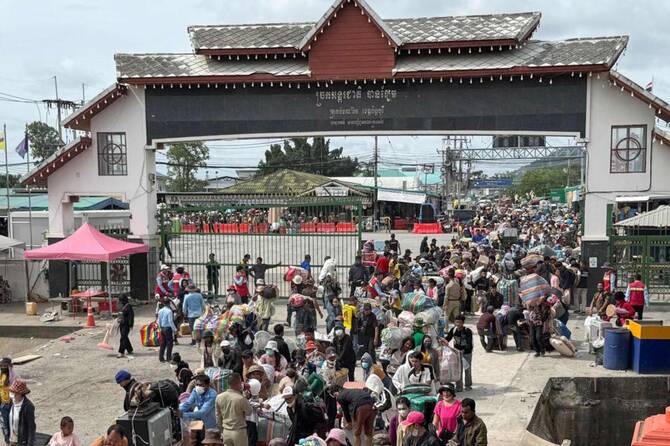Thousands of Cambodian migrant workers have fled Thailand and crossed back into Cambodia, following deadly border clashes that erupted on July 24. The mass return comes despite a ceasefire agreement, as many continue to fear for their safety.
According to Cambodia’s Ministry of Labour, more than 750,000 Cambodians, including women and children, have returned in just over a week. The Ban Laem-Daung border crossing has been one of the busiest, with crowds of migrants arriving daily, many of them carrying their personal belongings and travelling with families.
The fighting between Thai and Cambodian forces was sparked by a long-standing dispute over ancient temples along the border. So far, at least 43 people have been killed in the conflict. Although both countries agreed to a ceasefire last Tuesday, the situation remains tense. Reports of attacks on Cambodian migrants in Thailand have continued, leading many to leave as quickly as possible.
Thai authorities have not given an official count of how many migrants have left, but local media reports in Thailand estimate that more than 200,000 people have crossed the border. An immigration officer confirmed that many are leaving, but said no final figures have been released yet.
Currently, over 1.2 million Cambodians live and work in Thailand, many of them in low-wage jobs in construction, agriculture, and domestic service. These workers are among the most vulnerable during times of political unrest and violence.
The recent conflict also caused nearly 300,000 people to be displaced along the rural border regions, where military forces used jets, rockets, and artillery. Many civilians were forced to abandon their homes, seeking refuge in safer areas.
To reduce tensions, officials from both Thailand and Cambodia have initiated peace talks in Malaysia, aiming to prevent further violence. However, Cambodia’s Defence Ministry spokesperson, Maly Socheata, confirmed that the military remains on high alert. The border area is being closely monitored, with both countries watching for any new escalation.
This crisis highlights the challenges faced by migrant communities during armed conflicts and the urgent need for long-term diplomatic solutions. Many of the returning Cambodian migrants now face uncertainty about their jobs, income, and living conditions, raising concerns about how they will rebuild their lives after being forced to leave Thailand.

